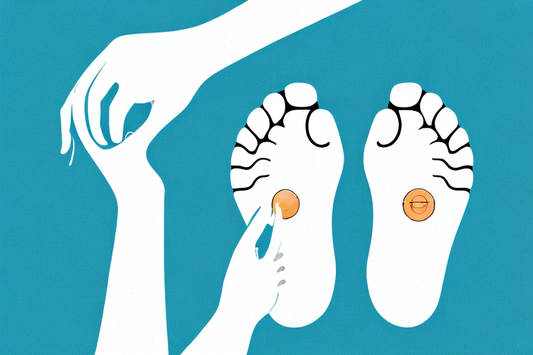
"The Ultimate Guide to Neuropathy Treatment: How to Manage Symptoms and Improve Quality of Life"
Neuropathy is a condition that affects the nervous system and can cause a wide range of symptoms, including pain, numbness, and tingling in the extremities. If left untreated, these symptoms can worsen over time and significantly impact a person's quality of life. However, with proper management and treatment, it is possible to improve symptoms and maintain a better quality of life. In this ultimate guide, we will cover everything you need to know about neuropathy treatment and how to manage its symptoms.
Understanding Neuropathy: Causes, Types, and Symptoms
Neuropathy is a complex and often misunderstood condition that affects millions of people around the world. It can be caused by a wide range of factors, including diabetes, autoimmune disorders, infections, toxins, and physical injuries.
What is Neuropathy?
Neuropathy, also known as peripheral neuropathy, is a condition that affects the peripheral nerves. These nerves are responsible for transmitting signals between the brain and spinal cord to the rest of the body, including the arms, legs, and internal organs. When these nerves are damaged or disrupted, it can cause a range of symptoms.
Neuropathy can be a debilitating condition, impacting a person's quality of life and ability to perform everyday tasks. It is important to understand the causes, types, and symptoms of neuropathy in order to effectively manage and treat the condition.
Common Causes of Neuropathy
As previously mentioned, neuropathy can be caused by a wide range of factors. One of the most common causes is diabetes. High blood sugar levels can damage the nerves over time, leading to neuropathy. Autoimmune disorders, such as lupus and rheumatoid arthritis, can also cause inflammation that damages nerves. Infections, including HIV, hepatitis, and Lyme disease, can damage the nerves directly or through inflammation. Exposure to toxic substances such as chemotherapy drugs, alcohol, and heavy metals can also damage nerves. Finally, physical injuries such as broken bones or car accidents can damage the nerves.
It is important to note that in some cases, the cause of neuropathy may be unknown.
Different Types of Neuropathy
There are many different types of neuropathy, each affecting different parts of the body. Peripheral neuropathy is the most common type and affects the hands, legs, and feet. Autonomic neuropathy affects the nerves that control internal organs such as the heart, bladder, and digestive system. Cranial neuropathy affects the nerves that control hearing, vision, and other senses. Focal neuropathy affects a specific nerve or group of nerves.
Each type of neuropathy can present with different symptoms and require different treatment approaches.
Recognizing the Symptoms of Neuropathy
The symptoms of neuropathy can vary depending on the type of nerve that is affected and the severity of the damage. Some common symptoms include:
- Pain – ranging from mild to severe, sharp or burning sensations.
- Numbness or tingling – typically starting in the fingers or toes and moving up the arms or legs.
- Muscle weakness – difficulty moving or walking, or trouble with fine motor skills.
- Uncoordinated movement – trouble with balance, resulting in falls.
- Changes in blood pressure, heart rate, and other bodily functions – relating to autonomic neuropathy.
It is important to note that not everyone with neuropathy will experience all of these symptoms. Additionally, symptoms can vary in severity and may come and go over time.
If you are experiencing symptoms of neuropathy, it is important to speak with your healthcare provider. They can help diagnose the condition and develop a treatment plan to manage your symptoms and improve your quality of life.
Diagnosing Neuropathy: Tests and Procedures
Neuropathy is a condition that affects the nerves, causing symptoms such as numbness, tingling, and pain. If you are experiencing any of these symptoms, it is important to consult a healthcare professional for an accurate diagnosis and appropriate treatment.
Consulting a Healthcare Professional
Your primary care physician or a specialist such as a neurologist can evaluate your symptoms, medical history, and perform a physical examination. They can help determine if your symptoms are due to neuropathy or another underlying condition.
It is important to be honest and thorough when discussing your symptoms and medical history with your healthcare professional. This information can help them make an accurate diagnosis and develop an effective treatment plan.
Physical Examination and Medical History
A physical examination can help identify any signs of nerve damage, such as muscle weakness or changes in reflexes. Your healthcare professional will also inquire about your medical history, including any underlying conditions or medications that could be contributing to your symptoms.
During the physical examination, your healthcare professional may also check your blood pressure, heart rate, and other vital signs. These tests can help identify any underlying conditions that may be contributing to your symptoms.
Blood Tests and Imaging Studies
Blood tests can help identify underlying causes of neuropathy, such as vitamin deficiencies, infections, or autoimmune disorders. Your healthcare professional may also order imaging studies, such as an MRI or CT scan, to provide a more detailed view of the affected areas.
These tests can help identify any abnormalities or damage to the nerves, which can help your healthcare professional make an accurate diagnosis and develop an appropriate treatment plan.
Nerve Conduction Studies and Electromyography
Nerve conduction studies and electromyography (EMG) are tests that evaluate nerve function and can help diagnose the type and severity of neuropathy. These tests involve placing electrodes on the skin and measuring the electrical activity of the nerves.
During a nerve conduction study, your healthcare professional will measure the speed and strength of the electrical signals that travel through your nerves. An EMG measures the electrical activity of your muscles when they are at rest and when they are contracting.
These tests can help identify any abnormalities or damage to the nerves, which can help your healthcare professional make an accurate diagnosis and develop an appropriate treatment plan.
In conclusion, if you are experiencing symptoms of neuropathy, it is important to consult a healthcare professional for an accurate diagnosis and appropriate treatment. Your healthcare professional may perform a physical examination, order blood tests and imaging studies, and conduct nerve conduction studies and electromyography to help diagnose and treat your condition.
Non-Pharmacological Treatments for Neuropathy
Lifestyle Changes for Neuropathy Management
Neuropathy is a condition that affects the nerves, causing pain, numbness, and tingling sensations. While medication can help manage the symptoms, there are also non-pharmacological treatments that can help alleviate symptoms and slow the progression of neuropathy. Making certain lifestyle changes can help:
- Maintain a healthy diet: Eating a diet low in sugar and rich in fruits, vegetables, and whole grains can help reduce inflammation and improve blood sugar control. This can be especially helpful for individuals with diabetes-related neuropathy.
- Manage blood sugar levels: Keeping blood sugar levels under control can help prevent further nerve damage. This can be achieved through medication, diet, and exercise.
- Exercise: Daily physical activity can help improve blood flow and reduce symptoms. Low-impact exercises such as walking, swimming, and cycling can be especially beneficial.
- Quit smoking: Smoking can worsen symptoms and increase the risk of complications. Quitting smoking can help reduce inflammation and improve blood flow.
- Reduce alcohol consumption: Alcohol can damage nerves and worsen symptoms. Reducing alcohol consumption or quitting altogether can help improve symptoms.
Physical Therapy and Exercise
Physical therapy and exercise can help improve muscle strength, flexibility, and overall mobility. An experienced physical therapist can develop a customized treatment plan to address your specific symptoms and needs. Physical therapy can include exercises to improve balance, coordination, and range of motion. It can also include massage therapy and other manual techniques to help reduce pain and improve circulation.
Alternative Therapies: Acupuncture, Massage, and More
Alternative therapies such as acupuncture, massage, and chiropractic care can provide relief for some individuals. These therapies can help reduce pain and improve mobility. Acupuncture involves the insertion of thin needles into specific points on the body to stimulate nerve function and reduce pain. Massage therapy can help reduce muscle tension and improve circulation. Chiropractic care can help improve spinal alignment and reduce nerve compression. However, it is important to consult with your healthcare professional before starting any alternative therapies.
Nutrition and Supplements for Neuropathy Support
Specific vitamins and supplements can provide support for individuals with neuropathy. Vitamin B12 injections can help improve nerve function and reduce symptoms. Alpha-lipoic acid supplements can help reduce inflammation and improve blood sugar control. Other supplements such as magnesium and vitamin D can also be beneficial. However, it is crucial to consult with your healthcare professional before starting any supplements, as some can interfere with medications or exacerbate symptoms.
Overall, non-pharmacological treatments can be effective in managing neuropathy symptoms and improving quality of life. By making lifestyle changes, participating in physical therapy and exercise, trying alternative therapies, and incorporating supplements into your diet, you can take control of your neuropathy and reduce the impact it has on your daily life.
Pharmacological Treatments for Neuropathy
Neuropathy is a condition that occurs when the nerves in the body are damaged or injured. It can cause symptoms such as pain, numbness, tingling, and weakness. While there is no cure for neuropathy, there are various treatment options available to help manage the symptoms.
Prescription Medications
Prescription medications are often the first line of treatment for neuropathy. Pain relievers such as opioids or nonsteroidal anti-inflammatory drugs (NSAIDs) can help reduce pain and inflammation. Antidepressants such as amitriptyline or duloxetine can help improve mood and reduce pain. Anticonvulsants such as gabapentin or pregabalin can help decrease muscle spasms and other symptoms.
It is important to note that these medications can have side effects and should only be taken as prescribed by a healthcare provider.
Topical Treatments
Topical treatments can be applied directly to the skin to help reduce pain and numbness in targeted areas. Lidocaine patches can help numb the affected area, while capsaicin cream can help reduce pain by blocking the transmission of pain signals.
It is important to follow the instructions for use carefully and avoid applying these treatments to broken or irritated skin.
Nerve Block Injections
Nerve block injections involve the injection of a local anesthetic or steroid medication into the affected nerve. This can provide relief in specific areas by blocking pain signals to the affected nerves. These injections are typically only recommended for severe and localized pain.
It is important to discuss the risks and benefits of this treatment option with a healthcare provider before proceeding.
Overall, there are various pharmacological treatments available for neuropathy. It is important to work with a healthcare provider to determine the best treatment plan for individual needs and to carefully follow instructions for use.
Conclusion
Neuropathy can be a challenging condition to manage, but with proper treatment and management, it is possible to alleviate symptoms and improve overall quality of life. In summary, consulting a healthcare professional, making lifestyle changes, and exploring non-pharmacological and pharmacological treatments can all help manage the symptoms of neuropathy and improve overall quality of life.




